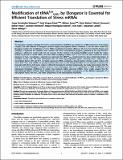Por favor, use este identificador para citar o enlazar a este item:
http://hdl.handle.net/10261/123929COMPARTIR / EXPORTAR:
 SHARE SHARE
 CORE
BASE CORE
BASE
|
|
| Visualizar otros formatos: MARC | Dublin Core | RDF | ORE | MODS | METS | DIDL | DATACITE | |

| Título: | Modification of tRNALys UUU by Elongator Is Essential for Efficient Translation of Stress mRNAs |
Autor: | Fernández-Vázquez, Jorge; Vargas-Pérez, Itzel; Sansó, Miriam; Buhne, Karin; Carmona, Mercè; Paulo, Esther; Hermand, Damien; Rodríguez-Gabriel, Miguel Ángel; Ayté, José; Leidel, Sebastián; Hidalgo, Elena | Fecha de publicación: | 18-jul-2013 | Editor: | Public Library of Science | Citación: | PLoS Genetics 9(7): e1003647 (2013) | Resumen: | The Elongator complex, including the histone acetyl transferase Sin3/Elp3, was isolated as an RNA polymerase II-interacting complex, and cells deficient in Elongator subunits display transcriptional defects. However, it has also been shown that Elongator mediates the modification of some tRNAs, modulating translation efficiency. We show here that the fission yeast Sin3/Elp3 is important for oxidative stress survival. The stress transcriptional program, governed by the Sty1-Atf1-Pcr1 pathway, is affected in mutant cells, but not severely. On the contrary, cells lacking Sin3/Elp3 cannot modify the uridine wobble nucleoside of certain tRNAs, and other tRNA modifying activities such as Ctu1-Ctu2 are also essential for normal tolerance to H2O2. In particular, a plasmid over-expressing the tRNALys UUU complements the stress-related phenotypes of Sin3/Elp3 mutant cells. We have determined that the main H2O2-dependent genes, including those coding for the transcription factors Atf1 and Pcr1, are highly expressed mRNAs containing a biased number of lysine-coding codons AAA versus AAG. Thus, their mRNAs are poorly translated after stress in cells lacking Sin3/Elp3 or Ctu2, whereas a mutated atf1 transcript with AAA-to-AAG lysine codons is efficiently translated in all strain backgrounds. Our study demonstrates that the lack of a functional Elongator complex results in stress phenotypes due to its contribution to tRNA modification and subsequent translation inefficiency of certain stress-induced, highly expressed mRNAs. These results suggest that the transcriptional defects of these strain backgrounds may be a secondary consequence of the deficient expression of a transcription factor, Atf1-Pcr1, and other components of the transcriptional machinery. | URI: | http://hdl.handle.net/10261/123929 | DOI: | 10.1371/journal.pgen.1003647 | Identificadores: | doi: 10.1371/journal.pgen.1003647 issn: 1553-7390 |
| Aparece en las colecciones: | (CBM) Artículos |
Ficheros en este ítem:
| Fichero | Descripción | Tamaño | Formato | |
|---|---|---|---|---|
| Miguel_Rodriguez_Gabriel_Modification_of_tRNAlys.pdf | 1,45 MB | Adobe PDF |  Visualizar/Abrir |
CORE Recommender
PubMed Central
Citations
79
checked on 25-feb-2024
SCOPUSTM
Citations
107
checked on 23-abr-2024
WEB OF SCIENCETM
Citations
101
checked on 29-feb-2024
Page view(s)
226
checked on 22-abr-2024
Download(s)
244
checked on 22-abr-2024
Google ScholarTM
Check
Altmetric
Altmetric
Artículos relacionados:
NOTA: Los ítems de Digital.CSIC están protegidos por copyright, con todos los derechos reservados, a menos que se indique lo contrario.
